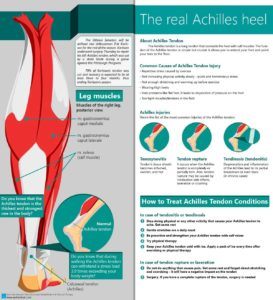Achilles Tendonitis Treatment in St. Louis
Our bodies have around 4,000 tendons connecting our muscles to our bones and enabling movement.
Out of those 4,000, the largest is the Achilles tendon. It connects our heel bones to our calf muscles and is present in each leg. Since it’s responsible for so much of our motion, the Achilles tendon is one of the most likely to be damaged. One such injury is Achilles tendonitis, a common condition that, if identified early, can be treated easily and effectively.
What Is Achilles Tendonitis?
Achilles tendonitis occurs when the tendon is overused, leading to injury. It’s one of several injuries the Achilles tendon can sustain.
When overused, this major tendon becomes inflamed and irritated, causing pain. There are two types of Achilles tendonitis, which have different causes and affect different demographics: insertional and non-insertional.
Insertional
This condition is common in runners, though any patient can develop it regardless of activity level. It affects the area where the heel bone and tendon are connected.
Non-Insertional
This condition shows up more often in active, young people. It affects the area above the heel.
What Are the Symptoms?
The symptoms are relatively easy to identify and include the following:
- Swelling that is constant and increasingly severe
- Presence of bone spurs
- Thickening of the tendon
- Activity prompts foot pain in heels or along the tendon
What Are the Causes?
One of Achilles tendonitis’s major causes is bone spurs, as the hard bone growths can cause pain by rubbing against the tendon. Muscle tension is another factor, as overly tight calf muscles are at risk of stress during intense activity. Finally, repetitive muscle stress can cause painful inflammation, or pushing your body too hard, too fast.
When Should You See a Medical Professional?
While this condition can often be treated at home, more serious cases require medical attention. Upon recognizing symptoms, you should schedule an appointment with your doctor to verify your tendon isn’t torn or otherwise severely injured. Since there are many ways to injure your Achilles tendon, you can’t know the root cause of symptoms without a formal diagnosis. At Horizon Foot & Ankle Institute, we are here to answer your questions about your pain and any treatments that could help.
How Is It Diagnosed?
To eliminate tears as the underlying cause, your doctor may order any of the following:
- Magnetic resonance imaging
- Ultrasound
- X-ray
Your physician may also examine your leg to evaluate the following:
- Reflexes
- Range of motion
- Alignment
- Flexibility
- Swelling
What Are Available Treatments?
Treatment varies by severity. The most severe cases may require surgery, though this is usually a last resort if other treatments don’t work.
Other treatments include these:
- Orthopedic devices such as shoe inserts
- Strengthening and stretching exercises
- Pain and anti-inflammatory medications
If the injury is mild, your doctor may recommend home treatments:
- Elevation
- Compression
- Ice
- Rest
You can also take over-the-counter pain medication to combat tenderness and swelling.
How Can You Prevent Achilles Tendonitis?
The good news is, there are ways to prevent Achilles tendonitis. First and foremost, you should avoid taking on aggressive physical activity you’re not ready for. Instead, make sure to warm up before exercising and increase difficulty gradually. What you wear can also make a difference; choose supportive shoes with good heel cushioning to prevent undue stress on your tendons.
If you live an active lifestyle, you should also incorporate calf strengthening exercises into your routine. Additionally, make sure you alternate low-impact and high-impact activities to give your body the time it needs to recover.
How Can Horizon Foot & Ankle Institute Help?
Do you have a foot injury? Then you should see the medical professionals at Horizon Foot & Ankle Institute. Our staff is dedicated to helping patients get back up and running. For more information or to schedule an appointment, give us a call at (314) 381-1800 or contact us online.
Featured Image: goa novi / Shutterstock
HORIZON FOOT & ANKLE INSTITUTE
Phone: (314) 381-1800
Fax: (314) 442-7749
info@horizonfootankle.com
6400 Clayton Rd Unit 412
St. Louis, MO 63117
166 Industrial Blvd
Festus MO 63028

